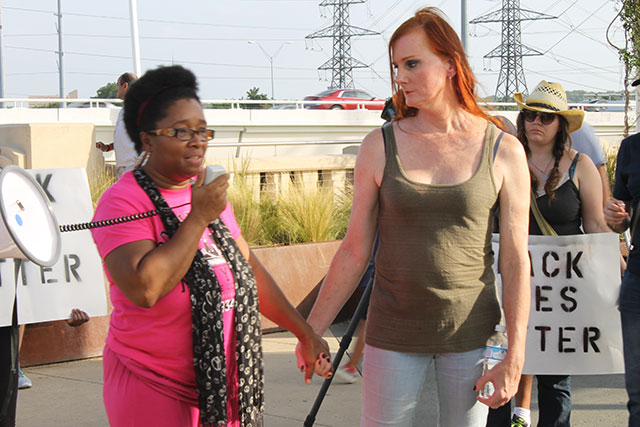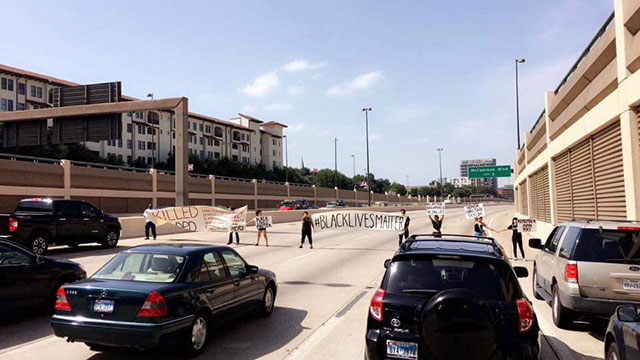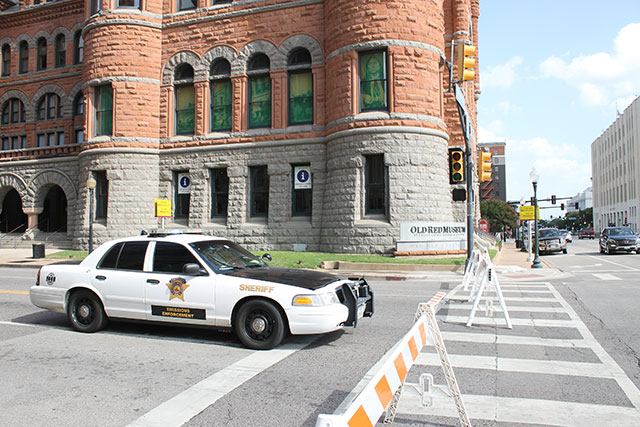
Honest, paywall-free news is rare. Please support our boldly independent journalism with a donation of any size.
Longtime Dallas organizers who have worked for years to reform the Dallas Police Department’s (DPD) use-of-force practices mourned the July 7 deadly shooting of five Dallas police officers by a lone gunman, as well as this month’s fatal police-perpetrated shootings of Alton Sterling and Philando Castile, during an observance and rally at Dallas’s Margaret Hunt Hill bridge, on Sunday, July 10.
Some of those organizers had participated in the July 7 peaceful protest in Dallas against the police-perpetrated shootings of Sterling in Baton Rouge, Louisiana, and Castile in Falcon Heights, Minnesota. They spoke about their experiences after hearing alleged gunman Micah Johnson’s first shots ring out into the evening air.
“It was horrific; I was parked right there,” CD Kirven, an activist and Dallas resident, told Truthout, referring to El Centro college, the location where Johnson allegedly began targeting officers. She spoke at the July 7 rally before the shooting.
“We grieve the five police officers who passed away, and we grieve the Black men that were murdered [July 7] and who will be murdered in the upcoming weeks, until this epidemic of racial injustice is solved,” Kirven said.

While walking up to the rally and observance spot on the bridge, Kirven expressed anxiety about the future of organizing against police use-of-force practices in Dallas. “I’m breathing heavy even just coming up here,” Kirven said about the event, organized by the Dallas Coalition Against Bigotry. “To be afraid to go to a rally is really a new experience for me.”
Community residents who experienced violence at the hands of DPD and Dallas Area Rapid Transit (DART) officers shared the stories of their interactions with Dallas police while also grieving the loss of the five Dallas officers’ lives.
Green consoled one young girl who was crying as they listened to the intermittent live fire outside by singing “This Little Light of Mine.”
Dallas resident Olinka Green also attended and spoke at the July 7 protest before the shooting. She told Truthout that when shots broke out, she ran with a group of protesters to the nearby DART bus that had pulled to the side of the street, and ducked inside. Inside the bus, Green said that she consoled one young girl who was crying and hyperventilating as they listened to the intermittent live fire outside by singing “This Little Light of Mine” softly to her. Worried the shooter would come their way, they then left the bus and ran to Dallas’s Omni Hotel, where they sheltered in a café inside.
“One of my friends works for DART, his name is ‘Thumper,’ … and I was so worried about him, that something had happened to him, because I saw him out there that day, and when I heard there was a DART officer had been killed, I was like ‘Oh my God, I hope it’s not Thumper,'” Green told Truthout. “Nobody won in this situation…. I helped put that protest together, and I’m just so hurt that this happened.”
In May of 2015, Green was arrested and jailed after taking a beating from DART officers who confronted her about handing out flyers at Dallas’s West End DART station while protesting police killings of women of color. She describes how a DART officer on a Segway asked her if she had permission to hand out flyers, and that, after she put the flyers away, the officer told her that had to leave the station.
“While I respect the officers and their families who are grieving, we also need to take this opportunity to make sure that we don’t expand policing.”
At first, she proceeded to leave, but decided to return to get the officer’s badge number. When she came back to get the number, the officer arrested hwe and pinned her with the Segway against a barrier fence. That’s when things escalated. Green, worried about her sensitive back from a previous spinal surgery, says she held on to the fence to keep the Segway from pushing her to the ground, where she feared the officer would put a knee into her back, as she had witnessed cops doing in viral internet videos.

Green alleges the DART officer started screaming that she was assaulting her, even though Green’s hands were firmly grasping the fence. The officer then maced her, and another officer yanked her arm violently, leaving fingerprint impressions on her. When they put her in DART police car, she started screaming, “I’m someone’s mother! Black lives matter!”
Green was jailed and bonded out. She then faced a $30,000 fine on charges of assaulting two public servants but told Truthout that all charges were dropped after an outpouring of support from the Dallas activist community.
“Even though I was done like that by them, they’re still human at the end of the day. Everybody wants to go home at the end of the day,” Green said. “I know they were out of control, but I don’t wish nobody death. I sure don’t wish that.”
Organizers Fear Shooting Will Be Exploited
After the July 7 shooting shook the nation, Dallas organizers hope to prevent an expansion and escalation of policing and security measures in the Dallas/Forth Worth area.
Even though many activists fear a heightened potential for retaliation against organizers taking action under the banner of Black Lives Matter in Dallas, a few still continue to take risks to mourn for the victims of police-perpetrated shootings in Dallas and surrounding cities.
On Monday, July 11, a group of eight protesters shut down Highway 75 in Dallas during rush hour for five to ten minutes to put a spotlight on those killed by the DPD. The traffic shutdown took place just a few hours before a candlelight vigil was held in front of Dallas City Hall for the five Dallas officers.

“While I respect the officers and their families who are grieving, we also need to take this opportunity to make sure that we don’t expand policing in this country at the expense of our civil liberties,” said Carol Zou, a Dallas resident and activist who participated in the highway blockade Monday. “So this action was to say that Black lives still matter in this context, and that we stand in solidarity with our brothers and sisters in Chicago, in Los Angeles, in Baton Rouge, in Atlanta and in Minnesota who are responding to acts of police brutality,” she said, referring to protests that took place across the U.S. this month.
Since 1973, every instance of death by police-perpetrated shooting in Dallas has been found to be justified.
Zou told Truthout that she was concerned about DPD’s use of a robot to deliver and detonate the bomb that ultimately killed Johnson during his alleged standoff with police this month, saying it’s “essentially using a drone to kill someone on United States soil,” and that it could lead to the increased militarization of police forces and further sanctioning of the use of high-tech, military-style gear in local police departments.
Last Monday, according to Zou, the group was confronted by two DPD officers who reiterated Dallas Police Chief David Brown’s recent comments to the news media, telling the activists that if they want to change things, they should become police officers. “That kind of remark is what I’m concerned about, which is to say that in the wake of the shooting, instead of acknowledging that this is a systemic problem, police forces are just calling to expand the police force,” she said.
Zou says that after the two DPD officers asked them to leave the highway, activists complied peacefully and followed officers’ requests.
Zou isn’t the only activist concerned about an expansion of policing in Dallas/Fort Worth and across the nation. Dallas resident Collette Flanagan, who lost her 25-year-old son Clinton Allen to DPD officer Clark Staller in March 2013, founded Mothers Against Police Brutality (MAPB) to be a voice for the families of police-perpetrated shooting victims who feel isolated by the criminal legal system. She was part of a delegation of mothers who lost children to police-perpetrated killings that met with elected officials and pushed for reforms in policing in Washington, D.C., after the uprising in Ferguson, Missouri, in 2014.

“I know how their mothers feel,” Flanagan told Truthout, referring to the mothers of the five Dallas officers who were shot last [July 7]. “I do think they’re going to escalate [policing] … and step it up.”
The Truth Behind Dallas’s “Model” Force
Flanagan, alongside other groups such as Dallas Communities Organizing for Change, have been pushing city leaders to implement reforms to the DPD that reflect community policing standards and practices for years, as Truthout has previously reported.
“This has always been one of my fears,” Flanagan said about the July 7 shooting. “That it would come to this — with no accountability, no transparency, no indictments, no convictions of cops who kill our children.”
Chief Brown came under criticism for a policy that allows officers to remain silent for 72 hours after being involved in a shooting.
Before a newly created Civil Rights Unit to independently investigate police-perpetrated shootings of civilians in Dallas County secured the indictments of three DPD police officers in 2014, Dallas’s criminal punishment system had hardly touched a DPD officer in more than 40 years. Since 1973, every instance of death by police-perpetrated shooting in Dallas — of which there are hundreds — has been found to be justified by DPD’s internal affairs department.
In 2014, the new Civil Rights Unit picked up the indictments of DPD officers Cardan Spencer and Amy Wilburn for non-lethal police-perpetrated shootings, and DPD officer Bryan Burgess for manslaughter after he fatally struck Fred Bradford with his patrol car in 2013. But since the 1973 police-perpetrated shooting of 12-year-old Santos Rodriguez in the back of a DPD squad car sparked an uprising — as well as national hearings on the department’s use-of-force policies — to this day, no DPD officer has been indicted for a fatal police shooting in more than 42 years.
Additionally, Chief Brown came under criticism in November of 2013 for quietly instituting a 72-hour review policy that permits officers to remain silent for 72 hours after being involved in a shooting, allowing them to review any evidence against them before making an official statement. The controversial policy was initiated after the Public Integrity Unit secured the indictment of Spencer for the non-lethal shooting of Bobby Bennett, which was caught on video.
Still, none of the cases of the three DPD officers indicted in 2014 have gone to trial under District Attorney Susan Hawk, who was heavily backed by the Dallas Police Association in her bid to unseat former District Attorney Craig Watkins, who initially created the Civil Rights Unit to independently investigate police-perpetrated shootings in Dallas. The Police Association is the city’s largest police union, and repeatedly denounced the indictments of the three DPD officers throughout 2014.
The media have ignored the fact that many of the DPD’s accountability measures were implemented under pressure from police accountability activists.
While the corporate media sing the praises of the DPD as a “model” of community policing in the wake of the July 7 shooting, the media have largely ignored the fact that such accountability measures, such as the Civil Rights Unit put into place by former District Attorne Watkins, were implemented under sustained pressure from police accountability activists. In fact, Dallas organizers say 2014’s indictments came only after they began protesting outside Watkins’ home, demanding accountability for Dallas officers after 40 years without any indictments in cases of fatal police-perpetrated shootings.
Similarly, measures such as a mandatory 30-day leave and psychological evaluations for officers involved in shootings, a prohibition on foot chases involving only one officer, a lengthening of the deadly use-of-force response continuum and numerous other changes were only implemented after Flanagan and other Dallas police accountability activists had a series of meetings with Chief Brown and made demands for reforms.
But a lot of work still remains for activists in Dallas. Flanagan says some of these changes have been made only on paper. Additionally, her group is calling for special independent prosecutors to investigate police-perpetrated shootings, random and periodic drug testing of all DPD officers, deadly force training for DPD officers that is approved by the Justice Department, a federal database for problem officers and compensation for victims, among other policy prescriptions.
Between July 2002 and July 2013, there were 185 police-perpetrated shootings reported by the DPD, with 58 resulting in a fatality.
Using open records requests, police accountability groups in Dallas also produced their own report on fatal police-perpetrated shootings by the DPD in 2014 as part of an administrative complaint with the Justice Department’s Civil Rights Division alleging that the DPD has participated in a pattern and practice of excessive use of force against Black and Latino people, echoing a national trend. The DPD only began posting information regarding DPD police-perpetrated shootings online after the complaint was filed.
Truthout previously reported that, between July 2002 and July 2013, there were 185 police-perpetrated shootings reported by the DPD, with 58 resulting in a fatality. Black and Latino fatalities accounted for 43 of these: 74 percent of all lethal police-perpetrated shootings. Thirty-six of the 185 police-perpetrated shooting victims were unarmed, according to the complaint.
Within that 10-year period, 33 Black people were killed, accounting for nearly 57 percent of all fatalities committed by Dallas police officers, although Black residents account for only 25 percent of Dallas’s population, according to the 2010 U.S. census. Ten Latinos were killed in police-perpetrated shootings during the same period. Combined, the rate of Black and Latino police-perpetrated shooting fatalities is 48 percent higher than white police-perpetrated shooting fatalities.
A separate report last year from the Chicago-based Better Government Association found that Dallas ranked third for deadly police-perpetrated shootings out of the nation’s 10 largest cities from 2010 through 2014. (The report, however, did not include information about race.)
While the media has praised DPD for its lack of any fatal police-perpetrated shootings this year, according to DPD’s own data, the department recorded 11 police shootings last year, with five resulting in fatalities, and one shoot-and-miss case this year. Moreover, the fact that the department has had so few shootings this year is, in part, an outcome of the pressure that police accountability activists in Dallas have put on the department in recent years.
However, Flanagan points to problems with the way DPD records its own data on police-perpetrated shootings. “For instance, to skew the numbers, so it doesn’t look like they’re killing so many unarmed men, … my son Clinton is [recorded as being] armed, and do you know what his weapon was? His hands. Clinton was not a martial arts expert or championship boxer, but that’s how they skew the numbers.”
Additionally, in November 2015, DPD released statistics showing that complaints of excessive force have fallen. But Mothers Against Police Brutality alleges that that’s because DPD dismisses nearly all of its complaints.
“Nobody called the parents when our children were killed…. The mayor has never even said he’s sorry to one parent that has lost a child [in Dallas],” Flanagan said. “This movement will not be derailed; it will not be denied. They must stop killing our children, and until our Black babies’ lives have the same value as white mothers’ babies’ lives, we will continue to say that ‘Black lives matter.’ We will continue to march. We will continue to rally. We will continue to be at the table of policymaking until real change comes.”
Media that fights fascism
Truthout is funded almost entirely by readers — that’s why we can speak truth to power and cut against the mainstream narrative. But independent journalists at Truthout face mounting political repression under Trump.
We rely on your support to survive McCarthyist censorship. Please make a tax-deductible one-time or monthly donation.